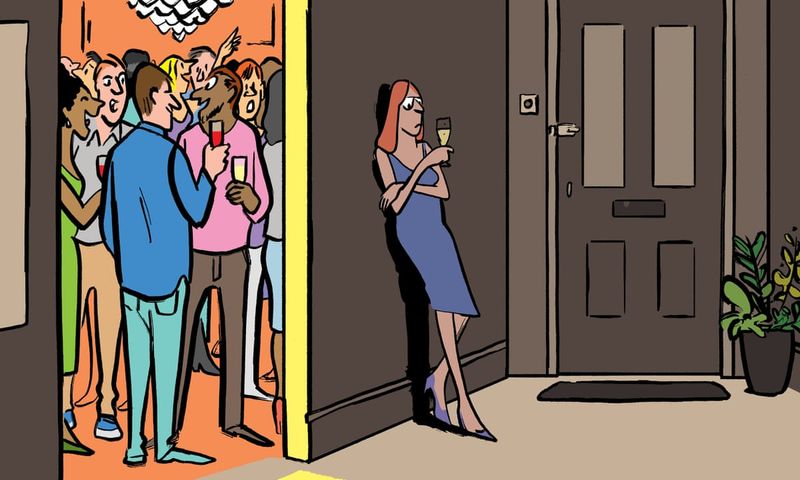There comes a moment. It doesn’t happen with fireworks or a meltdown. It’s quiet. Subtle. One day you’re bending over backward, shrinking yourself, smoothing everything over… And the next? You just. Can’t. You’re done. Not bitter. Not broken.
Solo too bone-deep tired to keep caring about things that never really mattered in the first place. Here are 19 beautiful, freeing, slightly savage things women stop caring about once exhaustion finally clears the fog—and the priorities shift from pleasing everyone to protecting their peace.
1. Making Everyone Else Comfortable at Your Own Expense
Ever found yourself nodding along when someone crosses a line, just to keep the peace? That chapter closes quietly, with a shrug and a little more self-respect. When exhaustion sets in, you realize your own comfort isn’t up for negotiation anymore.
There’s a certain relief in letting awkward silences hang or letting someone else squirm for a change. Suddenly, you’re no longer the emotional airbag for every uncomfortable moment. Your boundaries become visible, and honestly, if someone’s ruffled by your honesty, that’s their storm to weather.
It’s not about being rude—it’s about not making yourself smaller just to fit into someone else’s narrative. You choose self-protection over smoothing things over, and the freedom that comes with that? Priceless. Let them deal with their own discomfort. You’re off duty.
2. Keeping Up Appearances
Tidy house, perfect hair, coordinated outfits—who has the energy? There comes a point when you just stop caring if the dishes are done or if your roots are showing. The pressure to perform for imaginary judges fades, replaced with a sigh of relief.
You find joy in the little messes: socks on the floor, a chipped mug, hair in a ponytail for the third day straight. Life isn’t a magazine spread. It’s lived in, and that lived-in look becomes your new badge of honor.
The best part? You learn that the people who matter don’t care, and the people who care don’t matter. Embracing imperfection becomes a quiet rebellion against the endless scroll of perfect feeds. Your home, your rules, your peace.
3. Sucking It Up ‘Like a Good Girl’
Being the “good girl” was exhausting. You used to swallow your feelings, fake a smile, and pretend nothing bothered you. But eventually, the effort to keep the peace just stops making sense.
You start speaking up—even if your voice shakes or your hands tremble. The old habit of absorbing other people’s problems or pretending things don’t hurt falls away. Strength isn’t about silent suffering; it’s about giving yourself permission to say, “Enough.”
Freedom comes when you realize being a sponge isn’t a personality trait; it’s a burden. Now, your boundaries are clearer, your voice is steadier, and you let yourself feel things without apology. You’re allowed to be real, even if it rattles someone else.
4. Answering Texts Immediately
Those buzzing notifications used to set off a mini panic—must reply, must respond, must be available! Now, your phone can wait. The world won’t end if you answer a text three hours (or three days) later.
Your time is precious. Responding at your own pace becomes a small act of self-preservation. The guilt fades, replaced by the sweet satisfaction of not being glued to your screen.
You realize that instant replies are not a measure of love or loyalty. Some days, the bandwidth just isn’t there—and that’s okay. Your peace isn’t up for grabs every time your phone pings. You’re not a call center; you’re a human.
5. Explaining Yourself to People Who’ve Already Decided to Misunderstand You
Let’s be real: some folks just don’t want to get you. You could write novels explaining yourself, and they’d still twist your words into balloon animals. When you’re tired enough, you finally stop attending that circus.
You learn to recognize when someone isn’t arguing in good faith. All the explaining in the world won’t shift their perspective, so you pull back and save your energy for people who are actually listening.
Bless and block—digitally or emotionally. Life’s too short to hold a masterclass in empathy for those who refuse to learn. You’re not for everyone, and that’s more than fine.
6. Saying ‘Yes’ Out of Guilt
Remember RSVP-ing to things you dreaded, just to avoid disappointing people? Those days are history. Now, your “no” isn’t coated in guilt or sugar—it’s just honest.
You understand that agreeing to every request spreads you thinner than you can afford. Protecting your time becomes a fierce act of self-love. The old guilt? It’s replaced by relief and the realization that obligation isn’t love.
You start showing up for yourself, not for a checklist of other people’s expectations. And suddenly, the invitations you accept mean more, because you’re actually present—not just presentable. Your energy is yours to spend, not to loan out on demand.
7. Shrinking Your Joy So Others Don’t Feel Small
You used to tuck away your good news, worried it might make someone else jealous or uncomfortable. Not anymore. If you’ve survived the shadows, your joy deserves its day in the sun.
There’s a power in celebrating out loud—big smiles, loud laughs, and all. The people who get it will cheer with you. The rest can shade their eyes or look away.
Dimming your light so others can shine doesn’t help anyone. You owe it to yourself to honor your milestones and let yourself be happy, unapologetically. Your happiness is not a threat—it’s an invitation for others to chase their own.
8. Being Polite to People Who Are Disrespectful
You’ve mastered the subtle art of the neutral stare. Where you once forced a polite smile, now you give silence and side-eye to people who don’t respect you.
Age, authority, or volume don’t entitle anyone to your kindness if they’re not offering basic respect. Politeness is not a commodity you owe to everyone, especially those who trample boundaries.
You learn that protecting your dignity sometimes means saying less and standing firmer. If they want your warmth, they have to earn it. And if not, you’re happy to save your energy for people who deserve it.
9. Pretending to Enjoy Things You Actually Hate
Small talk at parties, forced laughter at bad jokes, pretending to love karaoke—nope. You’ve paid your dues, and you no longer fake enthusiasm for things that drain you.
There’s a strange relief in simply saying, “That’s not my thing.” You stop signing up for outings that make you cringe, and you’re not afraid to leave early or skip out altogether.
Your time is limited, and you’d rather spend it honestly—doing what you love or just resting in peace. No more pretending, no more performance. The real you gets the airtime now.
10. Worrying About Who Likes You
Once upon a time, you’d replay every conversation, wondering if you said the wrong thing or if someone liked you. These days? That soundtrack is on mute.
You stop bending over backward for approval, realizing your worth isn’t measured by someone else’s comfort or opinion. The right people will stick around, and the rest are just passing through.
Self-acceptance grows alongside your exhaustion. You choose alignment over applause. Being liked becomes a bonus, not a necessity. The peace that comes with this shift? Unmatched.
11. Being the Unpaid Emotional Support Human for Everyone Around You
For a while, you carried everyone else’s heartbreak and drama like it was your side gig. But emotional labor isn’t a volunteer job you need to take on.
You realize that it’s okay to step back—to listen without absorbing, to care without carrying. Your empathy has limits, and protecting your own mental space is an act of survival.
When exhaustion sets in, you stop signing up for every emotional emergency. You save your compassion for where it’s truly valued—and leave the rest at the door. Your shoulders are lighter for it.
12. Apologizing for Resting
You used to feel guilty for every nap, every slow morning, every skipped workout. Rest felt like an indulgence you hadn’t earned. Now, you see it as non-negotiable.
There’s a quiet rebellion in turning off your alarm or lounging with a book in hand. Those moments of doing “nothing” are really everything—healing, recalibrating, surviving.
You stop apologizing for needing downtime. Rest isn’t laziness; it’s wisdom. Your body and mind deserve care, no explanation required.
13. Keeping the Peace at the Cost of Your Own Sanity
You used to swallow your truth, biting your tongue to dodge every argument. But peace isn’t real if it comes at the price of your own sanity.
You realize that sometimes, things need to get messy before they get better. A little conflict is a sign of growth, not failure.
Letting go of people-pleasing opens the door to authenticity. You choose honest discomfort over fake harmony. It’s scary—but liberating.
14. Trying to ‘Fix’ Broken People Who Don’t Want to Heal
You were once the fixer—the one who tried to rescue every lost soul. But exhaustion teaches you that some people aren’t ready, and it’s not your job to patch the holes in their boat.
You lay down your emotional toolbelt and walk away from projects disguised as people. The urge to mend is replaced by the wisdom to know when to let go.
Helping is wonderful, but not when it drowns you. You don’t have to be the rehab center for the emotionally unavailable. It’s not your mess to clean up.
15. Sucking In Your Stomach in Every Photo
Every group photo used to be a mini workout—twisting, sucking in, angling. But one day, you’re too tired to care, and you just smile for real.
You let yourself take up space, stomach and all. The memories matter more than the perfect angles. There’s a special kind of beauty in the unfiltered, unposed snapshots.
The freedom is addictive. You stop worrying about bloat or double chins. You just show up, exactly as you are—and that’s the photo worth keeping.
16. Forcing Yourself to Be ‘On’ All the Time
The pressure to always be “on”—smiling, chatting, performing—is exhausting. You finally let yourself just be, even if that means being quiet or a little odd.
You’re allowed to show up in whatever mood you’re actually in, without apology. The curated personality gets shelved for something real and unrushed.
Not every room needs your energy. Sometimes, you’re just there to exist—and that’s enough. Permission granted to go off-script.
17. Trying to Be ‘Low Maintenance’ to Seem Likable
Gone are the days of pretending you don’t have preferences. You like what you like, and you’re no longer interested in shrinking those tastes to seem easygoing.
Chill-girl status is overrated. You deserve to have needs, quirks, and rituals that make you, you. The right people will love you for them, not in spite of them.
So order the fancy latte, make your special requests, and let yourself be high or low maintenance as needed. Authenticity is the new cool.
18. Feeling Guilty for Wanting More
Dreaming bigger once felt selfish, like you should be grateful and quiet. But wanting more—more joy, more space, more love—isn’t greed. It’s clarity.
Desires become a compass instead of a secret. You stop explaining or apologizing for wanting what lights you up. The world is full of opportunities, and you’re allowed to reach for them.
You realize that fulfillment isn’t a dirty word. Wanting more means you believe in possibilities—and that hope keeps you going, even on the hardest days.
19. Proving Your Worth
Once, you worked overtime at being enough. Now, you know you already are. The urge to prove yourself to everyone and their cousin just fades away.
You see your value as something given, not earned in endless competitions or self-improvement projects. Recognition is nice, but it doesn’t define you.
When someone doesn’t see your worth, it’s their blind spot—not your burden. You walk lighter, knowing you have nothing left to prove. You are, and that’s enough.




















